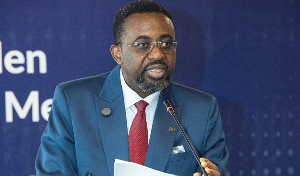Slow, costly cross-border transactions across Africa affecting families
 Bank of Ghana Governor, Dr. Johnson P. Asiama
Bank of Ghana Governor, Dr. Johnson P. Asiama
Top financial leaders from across Africa gathered on Monday, May 12, 2025 at the Bank of Ghana’s new headquarters for a landmark seminar on digital currency and payment systems, with a sharp focus on cutting remittance costs and improving cross-border transactions.
Bank of Ghana Governor Dr Johnson P. Asiama has stressed the urgent need for African countries to help bolster cross-border transactions across the continent.
According to him, slow and expensive transfers cost families and businesses billions in revenue.
Dr Asiamah said this at a landmark seminar on digital currency and payment systems which featured top financial leaders from across Africa gather at the Bank of Ghana’s new headquarters on May 12, 2025.
He further noted that Sub-Saharan Africa’s average 8% remittance fees remain stubbornly high despite global declines.
“Cross-border payments in particular, hold immense potential to drive inclusive growth and support livelihoods – yet they continue to face multiple frictions: high transaction costs, slow processing times, limited transparency, and inadequate interoperability.
“These challenges arise from a patchwork of regulatory frameworks, legacy systems, differing time zones, and a lack of alignment on data standards, consumer protections, and compliance protocols.
“For our continent, the stakes are high. Remittances, often lifelines for families, remain costly and inefficient. Small businesses struggle with the high friction of cross-border trade settlements. And regulators face growing complexity in balancing openness with oversight,” he said.
Governor Asiama highlighted the Pan-African Payment and Settlement System (PAPSS) which he described as “an important step toward reducing dependency on non-African clearing pathways and strengthening our financial sovereignty.”
He also pointed out innovative solutions like multi-regulator sandboxes and AI-powered supervision tools that could maintain security while enabling faster innovation.
Governor Asiama concluded by highlighting the human impact of these reforms, stating, “But as we talk about systems and standards, let us not lose sight of the real human stories behind these reforms. The single mother receiving remittances to keep her children in school. The young entrepreneur seeking payment channels to export their goods. The regulator striving to ensure innovation does not outpace resilience. These are the lives we must center in our work.
“In this regard, our gathering is not simply technical – it is profoundly strategic. We are here to co-create a regional vision where digital finance serves people, supports markets, and safeguards trust.”
The two-day summit highlights Africa’s ambitious efforts to modernize its financial infrastructure. Ghana’s leadership in the Pan-African Payment and Settlement System (PAPSS) took center stage, with the platform now linking 15 central banks and over 50 commercial banks to enable near-instant intra-African transactions.
A key announcement came regarding Ghana and Rwanda’s joint fintech passporting system, which will allow approved digital payment firms to operate across multiple African markets without redundant licensing processes.
The partners also revealed plans for a NextGen Digital Payment Infrastructure initiative to create standardized systems tailored to African needs.
ID/KA








